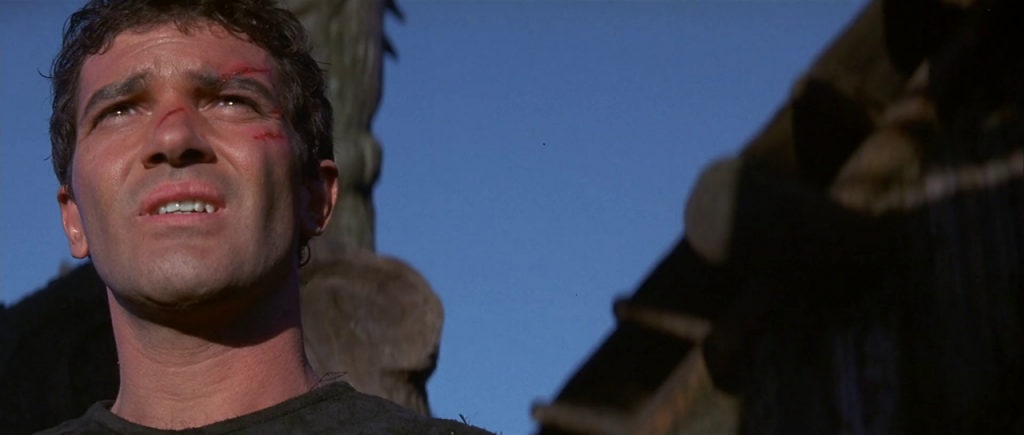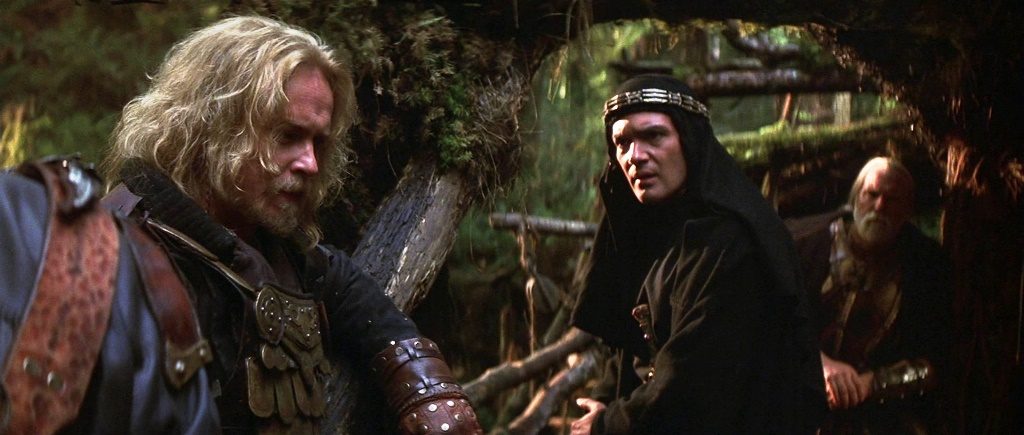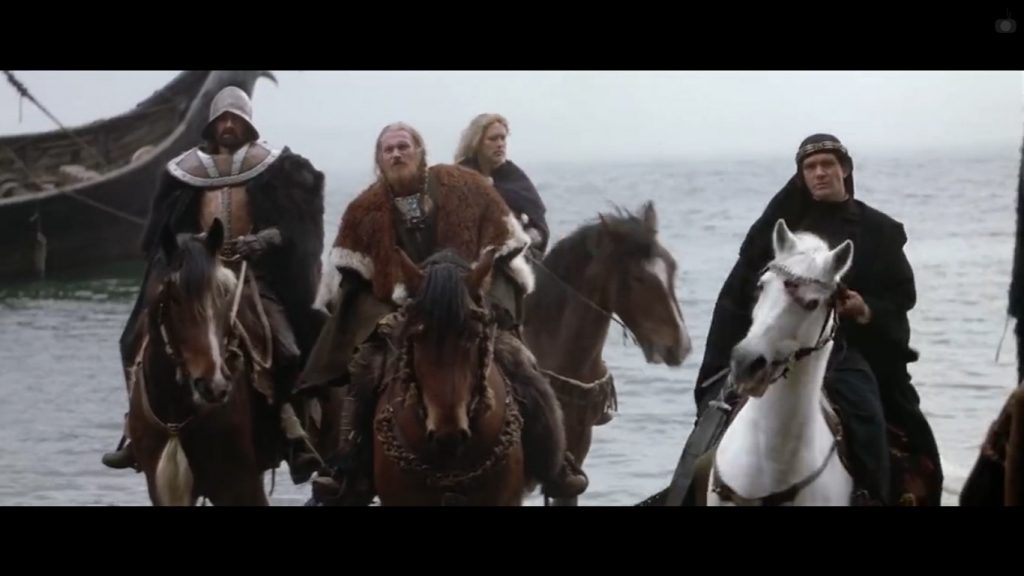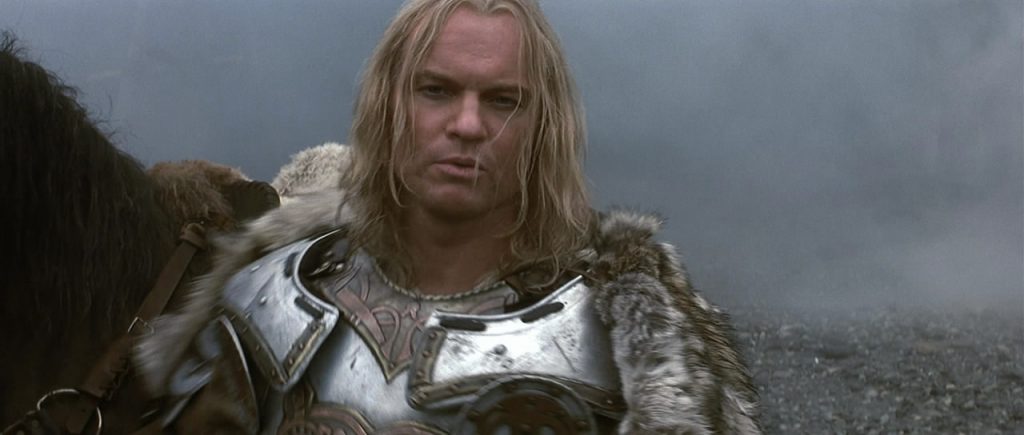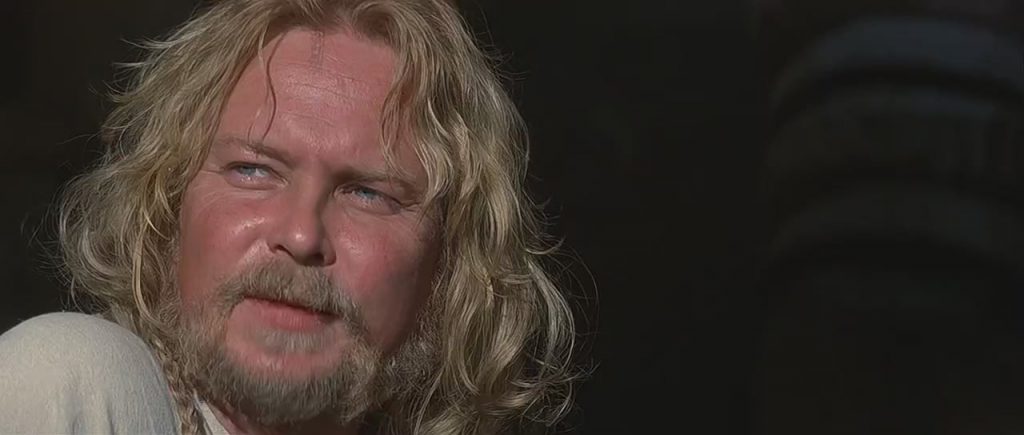So those of you who regularly read my stuff will probably know by now that I am an absolute sucker for a sword and sorcery movie. Perhaps I should be embarrassed by this, but I’m not. A truly good sword and sorcery movie is a very difficult thing to get right. The 1980s is considered the golden age of fantasy cinema, bringing us classics such as Krull, Willow, Hawk The Slayer, The Beastmaster, Ladyhawke, Excaliber, and Conan The Barbarian. However, the 90s saw the genre experience a bit of a slump. It wasn’t that fantasy movies were not being made in the 90s, they were, but they were mostly restricted to animated movies or somewhat safe, kid-friendly, marketable bets like Dragonheart, Hocus Pocus, Caspar, and Hook. Movies that were heavy on the sorcery but considerably lacking in the sword department. The revitalisation and return to mainstream consciousness of the fantasy movie only really occurred in 2001 with the release of Lord Of The Rings: The Fellowship Of The Ring.
So what is it that makes a good fantasy movie? That’s not an easy question to answer. As a genre the sword and sorcery flick is associated with a level of self-aware goofyness and tongue-in-cheek writing, however there are also great movies like Conan The Barbarian that take themselves almost completely seriously. A big budget can mean really great effects and a sense of epic proportions, but people still love the fantastically dated effects of movies like Jason And The Argonauts. Money is also no guarantee of a great story with likeable characters. You might be shooting for LOTR, but you may well end up with Eragon.
Of the few pre-LOTR attempts to revive the fantasy genre as something darker, more epic, and adult-themed, there is one standout. A mere two years before the release of Fellowship, Touchstone Pictures released a movie that was based on the Michael Crichton novel Eaters Of The Dead. The story was a combination of Beowulf and the account of a journey north with Vikings by 10th century traveller, Ahmad ibn Fadlan. Though the movie was originally supposed to have the same name as the book, the title was later changed to The 13th Warrior.
Antonio Banderas stars as Ahmad ibn Fadlan, a poet in the court of the Caliph of Baghdad. After bedding another man’s wife (come on, Ahmad, no-one is going to believe that her husband complained to the Caliph because you looked at her as she went past in a hallway) he is exiled from his home and sent to the north to become an ambassador. While travelling with his adviser, Melchisidek (Omar Sharif) Ahmad encounters an encampment of Norsemen on the Volga river. Though he is unable to speak the language Ahmad communicates with them by having Melchisidek act as an interpreter. A messenger from the Norse homeland in the far north arrives to request the help of the heir apparent, Buliwyf (Vladimir Kulich) The kingdom is being attacked by a terror that superstition says must not be named. When a wisewoman is summoned, she declares that thirteen men must be sent, and that the thirteenth man must not be a Norse man. Though greatly reluctant, Ahmad accompanies Buliwyf and his warriors to face the threat of the Wendol, bear-like creatures who eat the flesh of those they kill.
The production of The 13th Warrior was known to be particularly troubled. Though Die Hard and Predator director, John McTiernan, took the helm for the majority of the movie, test audience reactions to the initial screenings were so bad that Michael Crichton took over. Release of the movie was delayed for over a year while Crichton reshot the ending, fired the composer, had Jerry Goldsmith produce a new score, and famously locked McTiernan out of the editing room while he re-cut the footage. The original budget was around $85 million, but the various re-shoots and other changes swelled the cost to around $100 million. The total spend was rumoured to have ended up at around $160 million, but the movie only grossed nearly $62 million worldwide, making it a pretty spectacular box office flop. Omar Sharif was so embarrassed at being in The 13th Warrior that he quit acting for four years.
The production difficulties show. Plot threads like the jealous prince and a hinted secret relationship between Buliwyf and Queen Weilew are largely abandoned. The 10th century historical accuracy goes right out of the window, to the point where the map at the beginning of the movie displays Baghdad as being around 700 miles north of its actual location, the Tartars were not a danger for around 300 years after the movie is set, and one of the Vikings is clearly wearing a 16th century Spanish conquistador morion helmet. Most of the characters are barely even named, including the woman who is supposed to to be Ahmad’s love interest. Very occasionally somebody will make a sneeze-like sound which is apparently supposed to be a Viking name, but the story gives most of the characters very little identity beyond ‘The Tracker Guy’, ‘Tattoo Face Guy’ or ‘The Guy Who Is Always Laughing’
Here’s the thing, for me The 13th Warrior is a great fantasy movie as much for its aforementioned failures, as for its successes. This movie is probably the most perfect example of a Dungeons and Dragons campaign ever put to film. A group of adventurers with a mix of skills venture forth to do battle with the forces of evil, there are insignificant NPCs that only exist to provide plot critical details or equipment, and there’s even that one player who just HAS to play a different race/class to the rest of the group.
It doesn’t bother me that most of the characters of The 13th Warrior are unnamed and poorly developed, because the ones that are given the most screen time are entertaining and interesting enough to keep my attention. Vladimir Kulich, who fans of The Elder Scrolls V: Skyrim may recognise as the voice of Ulfric Stormcloak, turns in a mesmerising performance as Buliwyf. The character says little, but radiates the power and intelligence of a born leader. Buliwyf could easily have been stoic, boring, and forgettable, but he is actually one of the most compelling characters in the entire movie. Most of the time Buliwyf doesn’t even have to give his men any orders, they instinctively understand what he needs from them and there are several moments where a look or a gesture from him is enough to communicate his ideas. Buliwyf may not say much, but he understands the power and importance of words. It impresses him that Ahmad can read and write, and Buliwyf immediately sees the potential advantage in being able to record accounts of people and events, allowing them to be remembered long after those involved have left this world. Buliwyf also has a good grasp of politics, he talks the elderly king out of fighting with them without insulting him or damaging his honour. He also very cleverly deals with the king’s son, Prince Wigliff, who is very clearly threatened by having such a well thought of and excellent specimen of manliness as Buliwyf so close to his father’s throne.
But the real star of the show is Norwegian actor Dennis Storhøi as Herger the Joyous. Yes, despite him never being named in the movie that is actually the character’s name. In fact all the Norse warriors have names that include little descriptors, such as Edgtho the Silent (The Tracker Guy) Skeld the Superstitious (Tattoo Face Guy) and amazingly, Ragnar the Dour (The Guy Who Is Always Laughing) It seems a real shame that they took the time to come up with these great names, and then didn’t bother using them.
Herger serves as interpreter when Ahmad and Melchisidek arrive at the Norse camp, and travels with Ahmad as one of the thirteen. Herger is a jolly fellow with a quick wit and an even quicker sword. It is he who takes Ahmad under his wing, and helps him to earn his place within the group, giving him a sword and trying to assist him in becoming a passable warrior. However, Herger is not an amusing sidekick who provides comic relief and a foil for Ahmad to contrast against, he is the heart of the movie. Ahmad may be the protagonist, but for the most part he isn’t really that interesting. He is pretty whiny, useless, and not that sympathetic. Though the movie tries really hard to make itself seem like the story of Ahmad’s journey from guyliner-wearing pretty boy to badass warrior of God, Ahmad is just not engaging enough for that to work. Herger affectionately refers to Ahmad as “Little Brother” and that is what Ahmad is, the loved but irritating younger sibling. He tags along behind the Vikings like a spare part, serving less as the outsider who observes and studies his companions, and more as someone they have to babysit because the wisewoman said so. Apart from the one or two moments of perception that Ahmad brings to the proceedings, you could remove him from this story without really changing a thing. Try to tell me that this is Ahmad’s story all you like, movie, but it is Bulwyf and Herger who drive the story forward, and earn the emotional investment of the viewer.
Maybe that’s the secret of the good fantasy movie, something that will pull you in and along for the ride despite the natural cynicism of the modern cinema audience. This is what The 13th Warrior does, stretch your suspension of disbelief and then charm and distract you with something awesome. There is a LOT of fantasy in this fantasy, sorry ‘historical fiction action film’, but it’s ok, because each time you allow yourself to run with it the movie rewards you with a payoff.
Learning an entire language just by sitting around the fire and listening to people talk? Complete fantasy, but who cares! He just called that Viking a pig-eating son of a whore!
An Arab with a Spanish accent? Complete fantasy, but who cares? The Vikings just recited their battle prayer!
The Vikings on huge horses making fun of Ahmad’s Arabian race horse despite Arabian horses being larger than Norse horses in the 10th century? Complete fantasy, but who cares? He just jumped that horse over that Viking’s head!
Making a huge Viking broadsword into a completely balanced curved scimitar in less than a day using only a grinding wheel? Complete fantasy, but who cares? Weath the Musician asked if he could give it to his daughter!
The cave-dwelling Wendol managing to feed and maintain hundreds of perfectly groomed cavalry horses without anyone noticing? Complete fantasy, but who cares? Hundreds of torch-wielding cavalry riders heading down the mountain looks AWESOME!
You see what I mean?
For a fantasy movie to truly work, it has to be entertaining enough for you to want to fully commit yourself to it, even if that means temporarily leaving your brain behind. If you are willing to do that, then The 13th Warrior may have a lot to offer you. Yes, it’s stupid, but it’s a very satisfying kind of stupid. Even with the problems the script has some wonderful moments of dialogue. The casting is fantastic and I would totally watch a movie entirely about Herger the Joyous any day. There’s some amazing cinematography, costuming, and production design, despite all the historical inconsistencies. With a stunning score, and epic gore-filled battle scenes, this movie looks and sounds excellent. If you’re in the mood to immerse yourself in something silly but engaging? And watch appendages get torn/chopped off all over the place? I would definitely recommend a good sword and sorcery movie, and The 13th Warrior is just that. It may not be a good movie, but by Odin it REALLY tried. I believe The 13th Warrior has earned its place in the halls of Valhalla, among the pantheon of the great fantasy movies. It has certainly earned its place among my DVD collection, as a movie that I will return to time and time again when I need something dumb but exhilarating. If you were put off by all the negative critic reviews then give The 13th Warrior a look. It may well make its way into your list of movie guilty pleasures, and as we all know…
…guilty pleasures are the best pleasures.


